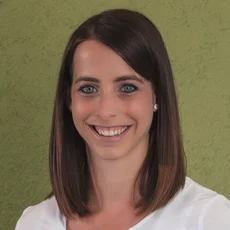Bachelor in Midwifery

«For me, it is a privilege to provide support to women and families during what are perhaps the most beautiful but also the most difficult hours of their lives. Midwifery is a diverse and fascinating field. The combination of academic study and practical training has prepared me well for my daily work as a midwife.»
Aline Crevoiserat is a midwife with a Bachelor's degree and is currently studying part-time for a Master's degree in Midwifery at ZHAW. She works as a vocational trainer in the Department of Obstetrics at the University Hospital Zurich.
Three reasons for studying midwifery at ZHAW
- Students of midwifery earning a Bachelor’s degree receive a diverse, practically oriented education that prepares them for work in a range of healthcare institutions, such as hospitals, birthing centres, the homes of women and their families, midwifery offices, breastfeeding consultation centres and maternity care centres.
- This programme is scientifically sound and practically oriented. Classes include reflection on work experiences, preferences of women and their families, as well as the latest scientific findings.
- This internationally recognised midwifery degree will open up a world of opportunities for graduates. By completing additional continuing education programmes, they can qualify for positions in teaching and research as well as for leadership roles in health care organisations.
My BSc in Midwifery

Midwives offer women and their families continuous support and counselling during pregnancy; they manage childbirth and provide care for the new mother and her new-born during the postpartum period and breastfeeding. In doing so, they work closely with the women and their families in the spirit of partnership and empathy. The midwife is part of a network of other health care and social welfare professionals.
Admission requirements
- Baccalaureate + additional module
- Federal Specialized Baccalaureate + additional module
- Federal Vocational Baccalaureate + additional module
- Degree from a College of Higher Education and Training

«I find it extremely interesting that I get to work with so many different people and experience such a wide variety of situations. No two days are the same. During my studies, I was able to establish numerous professional contacts that I will certainly be able to draw on later.»
Silja Diener completed her Bachelor's degree in Midwifery in 2024.
Programme structure
This is a full-time study programme and lasts three years plus a 10-month additional practical module. Upon graduation, you will receive a double ticket for your future:
- a licence to practice as a fully qualified midwife (Hebamme HF)
- an academic degree Bachelor of Science ZHAW in Midwifery
Study achievements are evaluated using ECTS (European Credit Transfer and Accumulation System) credits, which make your degree comparable across Europe. The study programme covers 180 ECTS credits, the equivalent of approximately 30 hours of study.
Our Bachelor’s degree programme in Midwifery fulfils the required national and international standards and educational requirements. 40 percent of the study programme consists of classroom teaching and 60 percent of self-directed study. In addition to lecture-style classes, methods are used to promote independent and action-based learning such as skills and simulation training, e-learning sequences, exercises, case-based learning, and self-study and project work.
Profession-specific modules
- Midwifery studies: Foundation knowledge and advanced knowledge in the following areas: pregnancy, birth, the postpartum period, anatomy, physiology, pathology, pharmacology, microbiology, hygiene, genetics, gynaecology, neonatology, paediatrics, and pharmacology
- Professional context: Communication and counselling, family systems, ethics, health care systems, occupational law, methods of learning and reflexion, health promotion and prevention, quality management, public relations, professional policy and professional development, internationalisation
- Skills and practical transfer: Training of practical skills and abilities, linking theory and practical experience
- Practical modules: Practical application of various areas of midwifery

«At ZHAW, students of midwifery develop the ability to confidently handle complex situations by combining specialist knowledge, practical experience and critical thinking in a balanced way.»
Larissa Zeller is a midwife with a Master's degree in Midwifery and works as a Research Assistant in the Bachelor's degree programme, as a midwife in the maternity ward as well as in antenatal and sibling classes.
Multi- and interprofessional Modules
Subjects include scientific work, communication, and interprofessional collaboration as well as various multi- and interprofessional topics involving society, culture and health care.
Practical experience
During the programme, students complete three internships of 12 to 14 weeks each in various institutions and fields of work. After the sixth semester, three internships totalling 10 months (additional module C) are completed to obtain the licence to practice.
Internship positions are arranged by the ZHAW and are located in clinics, birthing centres and with independent midwives. It is possible that students may be assigned to internships in nearby foreign countries (usually German-speaking areas). The terms of employment of the respective internship institution apply.
Bachelor thesis
To write their Bachelor’s thesis, students work on a professionally relevant topic and apply the scientific methods they have learnt as part of their studies.
Professional profile and educational objectives
Midwives work in hospitals, birthing centres, with women and their families at home, in midwifery offices, breastfeeding consultation centres and general counselling centres. Targeted continuing education programmes open midwives the opportunity to work in education, teaching or research.

”I wanted to learn a versatile profession with responsibility. As a midwife, I work independently and closely with women and their families. It is this interesting and diversified work that I enjoy.”
Stefanie Brägger completed her Bachelor's degree in 2015 and has been working as an independent midwife since 2019.
Competencies in seven roles
Students acquire the necessary skills to perform the following seven roles:
- As an expert, the midwife carries out specific tasks and makes appropriate decisions. University degree and licence to practice
- As a communicator, the midwife facilitates the building of trusting relationships and a selective sharing of information.
- As a collaborator, the midwife proactively participates in interdisciplinary teamwork.
- As a manager, the midwife assumes professional leadership and contributes to the effectiveness of the organisation as well as developing her own career.
- As a health advocate, the midwife is committed to the health of the woman and her family.
- As a health advocate, the midwife is committed to the health of women and their families.
- As a scholar, the midwife is committed to lifelong learning and the transfer of knowledge.
- As a member of the midwifery profession, midwives promote health and quality of life. They are committed to the ethical standards and values of the profession and pays attention to their own health.
At a glance
Degree: Bachelor of Science ZHAW in Midwifery
Workload: 180 ECTS credits
Duration of Study: 3 years (6 semesters) plus a 10-month additional practical module
Course Structure: full-time, practice-oriented Bachelor’s degree programme
Start of the Course: September (calendar week 38)
Registration Deadline: January 25
Teaching Location: Winterthur
Language of Instruction: German
Tuition Fees: CHF 720 per semester plus additional study-related expenses. An additional CHF 500 per semester for students whose place of residence is outside Switzerland at the start of their studies.
Consecutive Degree Programme: Master of Science (MSc) in Midwifery
Additional information
Studying in Switzerland
Switzerland supports students from other European countries studying at the ZHAW.
International Studies
Spending a semester or a clinical placement abroad is a priceless experience for any student and offers the opportunity to learn how professions are taught and practised in other countries.
Brochure International Relations
We offer a wide range of courses for international students. Learn more about our international activities in our brochure.
Studying in Switzerland
International Studies
Brochure International Relations
Switzerland supports students from other European countries studying at the ZHAW.
Spending a semester or a clinical placement abroad is a priceless experience for any student and offers the opportunity to learn how professions are taught and practised in other countries.
We offer a wide range of courses for international students. Learn more about our international activities in our brochure.